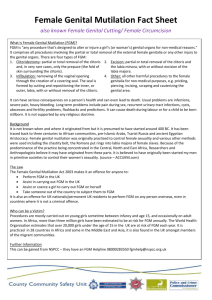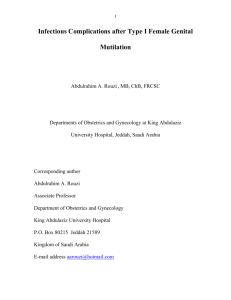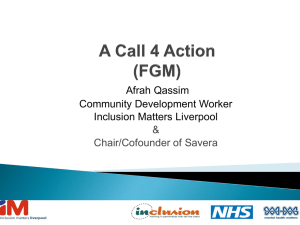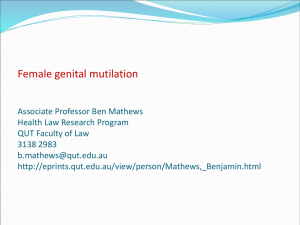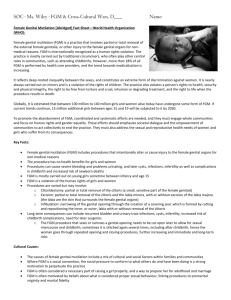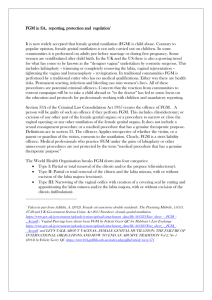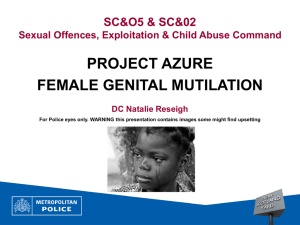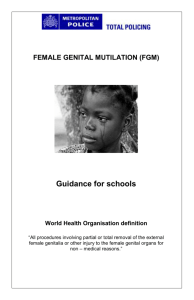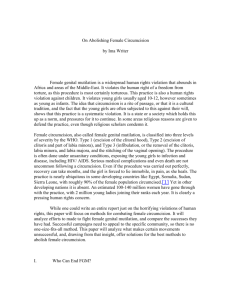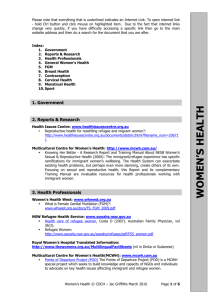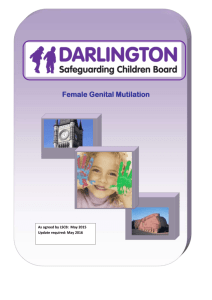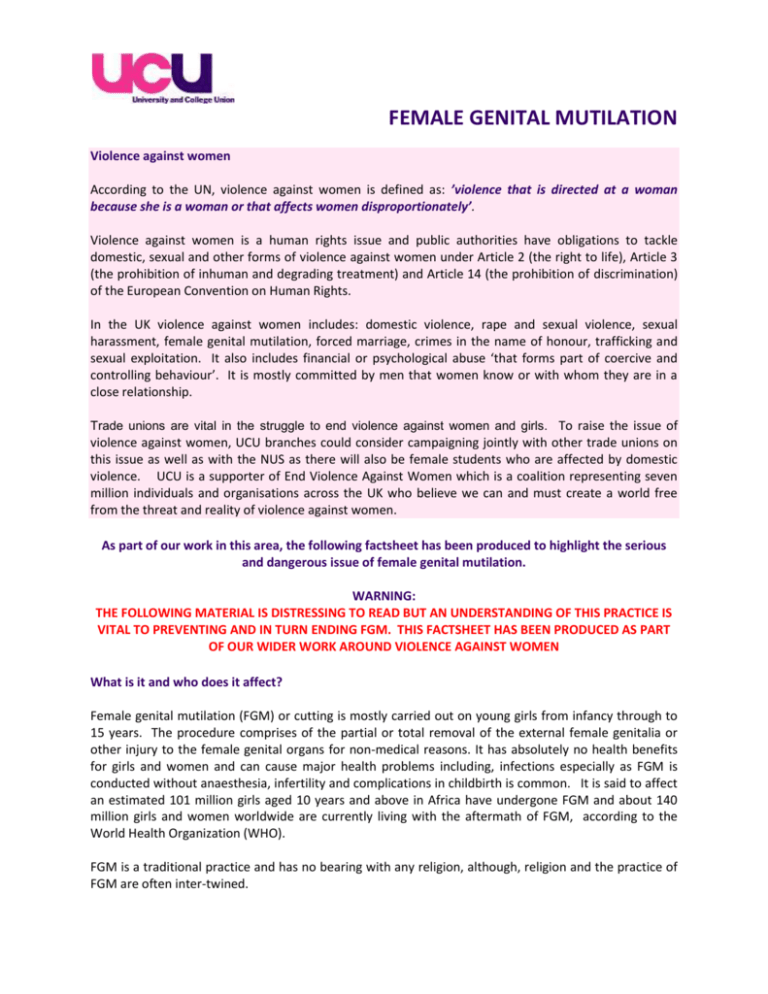
FEMALE GENITAL MUTILATION
Violence against women
According to the UN, violence against women is defined as: ’violence that is directed at a woman
because she is a woman or that affects women disproportionately’.
Violence against women is a human rights issue and public authorities have obligations to tackle
domestic, sexual and other forms of violence against women under Article 2 (the right to life), Article 3
(the prohibition of inhuman and degrading treatment) and Article 14 (the prohibition of discrimination)
of the European Convention on Human Rights.
In the UK violence against women includes: domestic violence, rape and sexual violence, sexual
harassment, female genital mutilation, forced marriage, crimes in the name of honour, trafficking and
sexual exploitation. It also includes financial or psychological abuse ‘that forms part of coercive and
controlling behaviour’. It is mostly committed by men that women know or with whom they are in a
close relationship.
Trade unions are vital in the struggle to end violence against women and girls. To raise the issue of
violence against women, UCU branches could consider campaigning jointly with other trade unions on
this issue as well as with the NUS as there will also be female students who are affected by domestic
violence. UCU is a supporter of End Violence Against Women which is a coalition representing seven
million individuals and organisations across the UK who believe we can and must create a world free
from the threat and reality of violence against women.
As part of our work in this area, the following factsheet has been produced to highlight the serious
and dangerous issue of female genital mutilation.
WARNING:
THE FOLLOWING MATERIAL IS DISTRESSING TO READ BUT AN UNDERSTANDING OF THIS PRACTICE IS
VITAL TO PREVENTING AND IN TURN ENDING FGM. THIS FACTSHEET HAS BEEN PRODUCED AS PART
OF OUR WIDER WORK AROUND VIOLENCE AGAINST WOMEN
What is it and who does it affect?
Female genital mutilation (FGM) or cutting is mostly carried out on young girls from infancy through to
15 years. The procedure comprises of the partial or total removal of the external female genitalia or
other injury to the female genital organs for non-medical reasons. It has absolutely no health benefits
for girls and women and can cause major health problems including, infections especially as FGM is
conducted without anaesthesia, infertility and complications in childbirth is common. It is said to affect
an estimated 101 million girls aged 10 years and above in Africa have undergone FGM and about 140
million girls and women worldwide are currently living with the aftermath of FGM, according to the
World Health Organization (WHO).
FGM is a traditional practice and has no bearing with any religion, although, religion and the practice of
FGM are often inter-twined.
It is practised for a myriad of reasons including ‘testing’ the purity of young girls and women, as well as a
method for economic security (similar to a dowry). The young girl or woman has no say in whether she
wants to undergo this procedure which is often planned without her knowledge and is sometimes seen
as a rite of passage. The act of FGM is conducted by older (traditional) women who would have
undergone themselves FGM or by medical practitioners – either way; this is a criminal practice that must
be stopped as it is a clear violation of the human rights of girls (many who cannot speak for themselves)
and women and is a clear act of violence against women and girls.
Types of FGM
Type I — Partial or total removal of the clitoris and/or the prepuce (clitoridectomy).
When it is important to distinguish between the major variations of Type I mutilation, the following
subdivisions are proposed: Type Ia, removal of the clitoral hood or prepuce only; Type Ib, removal of
the clitoris with the prepuce.
Type II — Partial or total removal of the clitoris and the labia minora, with or without excision of
the labia majora (excision).
When it is important to distinguish between the major variations that have been documented, the
following subdivisions are proposed: Type IIa, removal of the labia minora only; Type IIb, partial or
total removal of the clitoris and the labia minora; Type IIc, partial or total removal of the clitoris, the
labia minora and the labia majora. Note also that, in French, the term ‘excision’ is often used as a
general term covering all types of female genital mutilation.
Type III — Narrowing of the vaginal orifice with creation of a covering seal by cutting and
appositioning the labia minora and/or the labia majora, with or without excision of the clitoris
(infibulation).
Type IIIa, removal and apposition of the labia minora; Type IIIb, removal and apposition of the labia
majora.
Type IV — All other harmful procedures to the female genitalia for non-medical purposes, for
example: pricking, piercing, incising, scraping and cauterization.
Health costs for young girls and women
Because the practice of FGM is primarily conducted in unsanitary environments and no remedial
aftercare support, the young girl or woman will undoubtedly suffer severe health issues as a
consequence. The following list outlines some of the impact FGM has physically, sexually and
psychologically suffered by girls and young women.
Physical
Severe pain and shock
(sometimes death)
Haemorrhage
Infection of the wound
Urinary tract infection
Abscesses and ulcers
Fever
Septicaemia
Gangrene
Sexual
Pain during intercourse
Shame or embarrassment
about intimacy
Greater risk of HIV (because of
cuts which bleed)
Medical checks (e.g. smear
tests) difficult
Infertility
Psychological
Stigma
Anger and fear
Anxiety
Depression
Lack of trust
Relationship difficulties or
disorders
Low self-esteem
Flashbacks
Legislation
FGM has been illegal in the UK since 1985 when it was brought into legislation with the introduction of
The Prohibition of Female Circumcision Act 1985. This was replaced by The Female Genital Mutilation
Act 2003. To date, there have been no criminal prosecutions.
Helpline
In June 2013, the National Society for the Prevention of Cruelty to Children launched a UK-wide Female
Genital Mutilation Helpline. The service will be operated and staffed by specially trained child
protection helpline counsellors who will be able to offer advice, information and assistance to members
of the public and professionals. Referrals (as appropriate) will be made to statutory agencies and other
services. The helpline can be contacted on 0800 028 3550 or via emails sent to fgmhelp@nspcc.org.uk
The aim of this specialist helpline is to improve the safeguarding of children in the UK by increasing the
detection and protection of children at risk or who have become victims of female genital mutilation. It
will also facilitate, as necessary, the sharing of information with police and relevant agencies so that
intelligence can be gathered and appropriate action taken against those who facilitate female genital
mutilation against children. It will work in the same way as the main NSPCC helpline.
28 years from the Prohibition of Female Circumcision Act and 10 years from the Female Genital
Mutilation Act 2003 – the NSPCC instigates a dedicated helpline for the reporting of FGM. In less than
three months from its launch, the helpline has referred 34 potential cases of the crime to the
Metropolitan Police. There is much more that can be done.
Where to go for help and advice
End Violence Against Women (www.endviolenceagainstwomen.org.uk) EVAW is a unique coalition of
organisations and individuals campaigning to end all forms of violence against women.
Forward UK (www.forwarduk.org.uk) The Foundation for Women's Health, Research and
Development (FORWARD) is the leading campaign and support charity providing help with
FGM, including counselling, referrals, information, materials and training.
FGM National Clinical Group (www.fgmnationalgroup.org) UK-based charity dedicated to working with
women who have been affected by FGM and other related difficulties.
Women's Resource Centre (www.wrc.org.uk) Charity supporting women organisations to be more
effective and sustainable.
FEMALE GENITAL MUTILATION IS A CRIMINAL OFFENCE
IT IS AN ACT OF VIOLENCE AGAINST WOMEN

